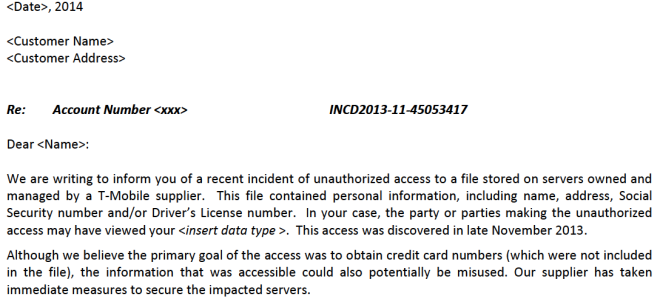2013 was not a great year for personal security. Whether it’s Snapchat or the NSA’s shenanigans, there have been more reports of account hacking than we’ve seen in a long time. Even Apple’s own developer account was shut down for a couple of weeks due to a security breach. It seems T-Mobile customers may have had their personal information compromised too.
DataBreaches.net has uncovered a letter that’s due to be sent out to T-Mobile customers soon outlining unauthorized access to its customers’ personal details. According to the letter, this access to a file stored at a supplier server was discovered in late November. The files in particular included information such as names, addresses, social security numbers and driving license numbers.
As explained in the general letter, it looks like those hackers accessing the file were actually looking for credit card numbers, which they didn’t get. Thankfully. As a gesture of good will, T-Mobile is also offering up 12 months of Experian’s ProtectMyID Elite membership to help customers keep up to date with any unauthorized access to their accounts/credit cards etc.
Although we believe the primary goal of the access was to obtain credit card numbers (which were not included in the file), the information that was accessible could also potentially be misused. Our supplier has taken immediate measures to secure the impacted servers.
We are also providing this notice to help you take steps to protect your personal information from possible misuse. We have arranged for you to receive one full year of ProtectMyID Elite, an Experian product which provides credit monitoring capabilities and assistance for identity theft protection including identity theft insurance. ProtectMyID Elite is completely free to you and enrolling in this program will not hurt your credit score. Follow the instructions below to activate ProtectMyID. Your enrollment is open until March 31, 2014.
Since this hasn’t become a major story of millions affected, I imagine that the number of customers affected by this is very minimal. And, although the details accessible from these files could potentially be misused, you can perhaps rest a little easier knowing that the hackers didn’t get what they had tried to get hold of. That said, it would frustrate me to know that my details may have been accessed in November and I didn’t find out until the new year.
To read the full letter, head on over to the California Department of Justice site where the letter has been made available to view.
Be sure to let us know if you receive the letter.
Via: DataBreaches

